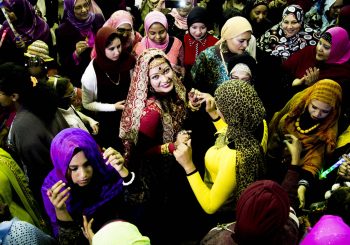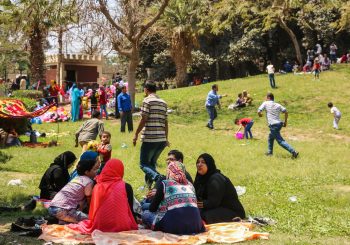‘Fallen Television’ or Television Waa’e is a Lebanese documentary film that critiques the screen culture featuring the complex array of geopolitical, sectarian, economic and cultural factors in Lebanon. This film examines the sectarian hostilities in the Lebanese television history that have characterized Lebanese religious, social, and political life even before the civil war 1975-1990.
Directed by Maya Majzoub, the film highlights the ideological dominance of sectarianism; Majzoub directed the 53-minute film putting the Lebanese TV culture on the map.
The film starts by a historical background on Lebanese television presented by series of snapshots drawing the broader image of the cultural environment ruling the Lebanese television. Only one minute into the film, you would grasp the milestone events that helped enforce and institutionalize sectarianism and commercialism within its discourse.
“Which one is feeding the other? Is it media or sectarianism?” narrated in the film. Majzoub starts by raising a rhetorical rather on-point question and proceeds with unfolding the history of media discourse in Lebanon.
Tackling the status of Lebanese television within three different time periods: pre-civil war, during civil war, and post-civil war offers a clear dichotomy of the effect of television in Lebanon.
In the 1950s, Lebanon was well prepared to host Television due to its stable and prosperous social, cultural and political state.
Launching the first commercial television station in the Arab world (CLT) in 1959 was the cornerstone for the unleash of television and media industry in Lebanon. Since then, series of government censorship actions in addition to business motivated actions shaped the culture of the lebanese television to support commercialism and sectarianism instead of cultural development.
The film highlights that television in Lebanon was exposed to the early French influence pointing that Western companies were financially and strategically involved in Lebanese television. Therefore “some consider that the Lebanese television was a tool for marketing and promoting Western cultural dominance, ” according to the film.
Since the civil war erupted in 1975, and through regulatory framework, Lebanese television channels played a role in reinforcing sectarianism instead of fighting it.
The film proceeds with rich analysis of the intersection between commercialism and political interests showing their effect on modern day Lebanon and sectarian crisis; it conceptually mirrors the sharp divisions of a war-torn society.
However, the film is an attempt to encourage the viewers to think more critically of the content they are exposed to from television channels.
The film is released by The American University in Beirut (AUB)’s Media Studies Department, edited by Ghina Hachicho under the supervision of Dr. Jad Melki.
It has won the Mrowa Award winner, named after renowned Lebanese journalist Kamel Mrowa, founder of Al-Hayat and The Daily Star newspapers, who was assassinated in 1966. The award honors annually an MA in Media Studies graduate with outstanding academic performance and who produces a project or thesis about the past, present or future of Arab journalism.






Comments (0)